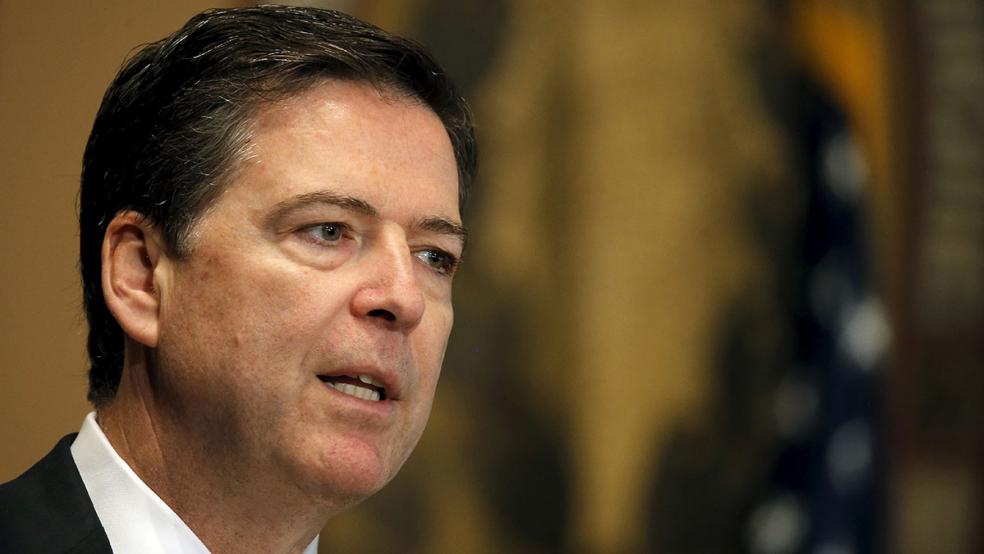In any normal election, this would have been game over for Hillary Clinton. Federal Bureau of Investigation Director James Comey just stood up in front of television cameras and declared that she and her colleagues had been “extremely careless in their handling of very sensitive, highly classified information” during Clinton’s time as secretary of state.
Clinton, as is widely known, used a private email account for her correspondence while running the State Department, and while she has acknowledged that it was a mistake to do so, she has also insisted repeatedly that she did not knowingly send or receive information that was classified at the time of transmission.
Related: Are Clinton and Trump Really in a Dead Heat?
That was untrue, Comey revealed Tuesday morning, in a lengthy statement to the media in which he excoriated Clinton’s judgment even as he announced that his investigators had not uncovered sufficient evidence to support a recommendation of criminal prosecution.
In fact, he said, investigators found more than 100 emails that contained classified information at the time they were sent and received. They also found emails containing classified information that Clinton did not turn over to the State Department, despite her insistence that she had provided everything of a non-personal nature.
“There is evidence to support a conclusion that any reasonable person in Secretary Clinton’s position, or in the position of those government employees with whom she was corresponding about these matters, should have known that an unclassified system was no place for that conversation,” Comey said. “In addition to this highly sensitive information, we also found information that was properly classified as Secret by the U.S. Intelligence Community at the time it was discussed on email.”
He said, “None of these emails should have been on any kind of unclassified system, but their presence is especially concerning because all of these e-mails were housed on unclassified personal servers not even supported by full-time security staff, like those found at Departments and Agencies of the U.S. Government—or even with a commercial service like Gmail.”
Related: Voters Are Having Trouble Getting to ‘Yes’ with Clinton and Trump
He went on to add that investigators could not rule out the possibility that Clinton’s private email account had been hacked by foreign governments hostile to the interests of the United States.
And buried near the end of Comey’s remarks was the real dagger:
“To be clear, this is not to suggest that in similar circumstances, a person who engaged in this activity would face no consequences. To the contrary, those individuals are often subject to security or administrative sanctions.”
That is an oblique reference to the fact that anybody else in government service who disregarded information security protocols so blatantly and for so long would not only have their security clearance stripped, but would be pretty unlikely to get it back. Ever.
Related: Under Fire, Lynch Removes Herself from Final Decision on Clinton Email
There will be a substantial outcry from Trump supporters and longtime Clinton opponents that the decision not to indict was the product of a political conspiracy. That theory was given fresh fuel last week, when Attorney General Loretta Lynch made the inexplicable decision to hold a private meeting with former president Bill Clinton while the investigation into his wife’s email use was ongoing.
Comey tried to address those concerns Tuesday, praising the professionalism of his investigators and insisting that there had been no outside influences on their decision not to seek an indictment.
But again, what’s really amazing here is that the lack of an indictment in this case really matters.
In a normal election year, the weight of these findings would likely destroy a candidate. The lack of an actual criminal indictment, from a political perspective, would be inconsequential. If a candidate can’t be trusted to safeguard top secret information related to national security, voters’ decisions about whether or not to give them the keys to the Oval Office aren’t going to hinge on whether or not actual jail time was involved.
But, as anybody who is paying attention knows all too well, this is not a normal election year.
Clinton’s likely opponent in the general election, Donald Trump, is so widely disliked, so spectacularly uninformed and ill-qualified, that most experts expect voters to look past the email issue altogether.
Hours after the Comey briefing, the Trump campaign’s sole response to the news was not to highlight the FBI director’s criticism of Clinton or the confirmation that she had not told the truth about her emails. It was to attack Comey himself.
Related: Loretta Lynch and Bill Clinton Cook up Another Headache for Hillary
FBI director said Crooked Hillary compromised our national security. No charges. Wow! #RiggedSystem
— Donald J. Trump (@realDonaldTrump) July 5, 2016
In a statement, a spokesman for Clinton said the campaign is “pleased that the career officials handling this case have determined that no further action by the Department is appropriate,” adding, “As the Secretary has long said, it was a mistake to use her personal email and she would not do it again. We are glad that this matter is now resolved.”
Historians will no doubt look back in wonder at 2016, the year when the bar for entry to the Oval Office was lowered to “not currently under indictment for mishandling state secrets.”





